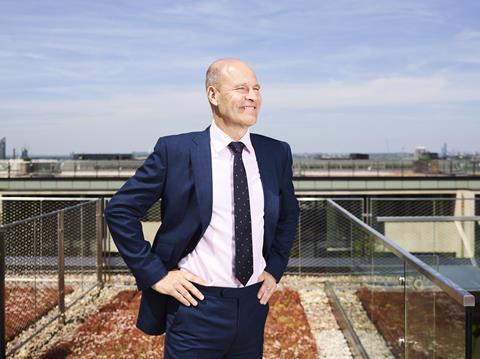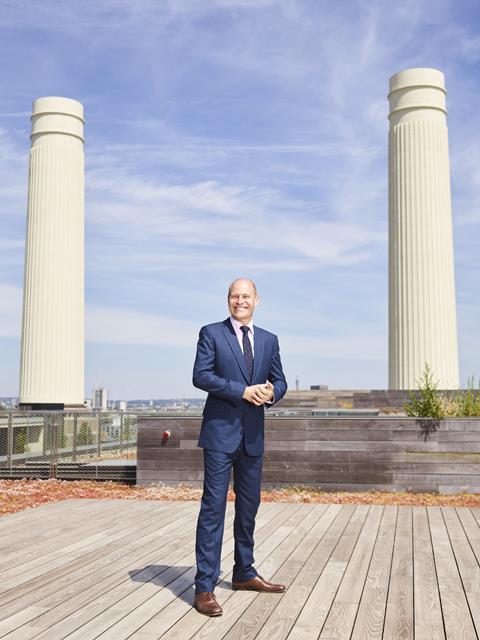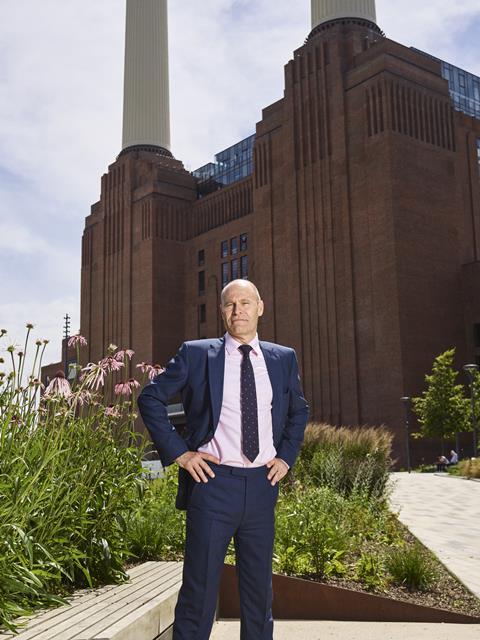The chief executive of the firm’s construction arm has been through three recessions but says the current conditions are unprecedented. He tells Dave Rogers about the firm’s plans to negotiate the coming months and how he can see a brighter future

“Competition is really, really important.” Gareth Lewis, the chief executive of Mace’s £1.5bn turnover construction arm, is standing on top of Battersea power station on a hot, sunny morning pointing out all the jobs that the firm is working on as the capital stretches out in all directions.
It is a remarkable view and, for those few with lots of money at their disposal – prices start at £865,000 and run into tens of millions of pounds – it will be theirs when the final residents of the 250 or so flats move into their new homes in a few weeks’ time.
Lewis admits that he wants to win every job he bids for but knows the law of averages says that he can’t. Instead, he lavishes praise on those he frequently comes up against. “Sir Robert McAlpine, Laing O’Rourke, Lendlease – all absolute quality competition. I’m pleased to compete with all of them.”

Mace’s work on the second phase of Battersea – basically, what the layman would know as the power station itself – is coming to an end after five years. The firm came in on a construction management contract after original contractor Skanska could not agree a fixed price.
“It turned into a CM [contruction management] opportunity,” Lewis says. “We both bid it and we won.”
The job is one that he will miss. “I’ve loved it,” he admits. “We’ve had a fantastic team at Battersea, the architect [Wilkinson Eyre] has been great. The client has been brilliant.”
I’ve been through three recessions but there has been nothing like this. Steel prices have been horrendous. It has gone from £800 to £1,600 a tonne
Lewis says Mace will look at further phases of the development which saw Carillion build the first phase, a slew of flats running away from the river, while McAlpine is completing work on flats designed by Foster & Partners and Frank Gehry.
As well as 253 apartments, with the first residents moving in last May, Mace’s work has involved building a new headquarters for tech giant Apple and over 100 retail units.
But, for Mace, this part of the job has the feel of one coming to an end – at one stage 2,800 people were working on it – and Lewis is looking at more opportunities elsewhere. There seem to be plenty.
“Our pipeline that we’re tracking is £5.7bn, more than we have ever tracked before. We are waiting on £2.4bn-worth of decisions. That’s double anything we have been waiting on before.”
He reels off a list of schemes that he is looking at. Asked if he would cast an eye over any rebuild of Manchester United’s Old Trafford stadium, he says: “We would if it was CM. We would prefer it if it was in the south, we are quite London-centric. It would probably suit Laing O’Rourke and SRM more than us, but we would look.”
Inflation
Despite everything, there is still a glut of work about. And by everything, that means what the industry has been hit with in the past six years. Brexit, a global pandemic and now rampant inflation.
“Unprecedented,” says Lewis of the latter. He has been in the industry since the mid 1980s, when he graduated from Bristol University with a degree in construction technology.
“I’ve been through three recessions but there has been nothing like this. Steel prices have been horrendous. It has gone from £800 to £1,600 a tonne.” He thinks the market might calm down in the coming weeks as alternatives to mills in Ukraine and Russia are found but is less optimistic about when overall inflation will start to flatline.
“There is more to come between now and the autumn, it’s going to be with us for the next six to 12 months,” he adds. “In the short term, it will get worse and we will see [inflation at] 10%.”
He says that the scale of price hikes on jobs has caused mid-sized schemes to be delayed by three months and the larger ones by six months or more as clients review budgets, value engineer projects or sit on their hands and hope that the headwinds pass. But developers still want to develop and builders still want to build.
“It’s not fair to go to our clients and say, ‘We’re passing it all on to you, you’re the consumer’. We have a duty of care to support construction. It’s in our interest for projects to go ahead. It’s not in our interest to kill a project off. Consultants don’t want projects to die, either. We have a duty of care to do things right.”
He says that Mace has told clients the firm is not looking to profiteer from inflation, reckoning it can fix around 80% of the cost leaving the remaining 20% – which covers materials – to be a variable cost. “We’re then managing that risk together.”

Clients fall into three categories right now when it comes to negotiating a revision of costs on deals already agreed before the steep materials rises really kicked in. “Some clients will say no, some will say, ‘Maybe, put a case forward’ and others will say, ‘How can we help?’ It is not in clients’ interests for us to do badly, it is not in our interest for the supply chain to do badly. This is a team game and, if we can all work together, take a bit of pain on the way, then we will get through it.”
What to do, though, about those clients who flatly refuse to help, point to the contract, shrug and say tough? “You have to take it on the chin.”
But Lewis has a long memory. “We are being a lot more selective about the work we go after and they will drop further down the list.”
Cashflow
As ever, cashflow is key – more so right now. Mace, which takes an average of 29 days to settle its bills, is paying some of its smaller subcontractors – such as bricklayers, dry liners, painters and decorators – fortnightly.
“Cash is so important for smaller suppliers, we’ve got to keep them moving. They pay their labour weekly and they need the cash regularly. We’re only as good as the quality of our supply chain and how they deliver for us. You have to look after them or they will go somewhere else.”
There is another reason, of course. According to the Insolvency Service, April this year saw 384 firms in the industry go under, compared with 419 the previous month. Both are 12-month records and there are worries that the number will get worse before it gets better.
I think we will see more firms go bust and cashflow is always the biggest cause
“I think we will see more firms go bust and cashflow is always the biggest cause,” Lewis says. Big firms like Mace are also not immune from being saddled with jobs agreed at one price only for costs to head rapidly north.
“If we are in the finishing stage of a project, I’ll worry less because we’ll just close it out. If we are at the start [of a job] we’re working with our clients to manage that [risk] very carefully without being seen as not being honourable. We don’t want a lose-lose situation where a supplier goes bust and we have to pick up the contract at a 10% premium, we go to the client and he gives us no sympathy.”
He does see some hope for the coming months, though. “Clients are much more sophisticated nowadays. They understand having a distressed project is not in their interests either.”
All this has meant a resurgence in CM contracts, which Lewis says plays to Mace’s strengths but which has also shone a spotlight on what risk contractors are prepared to take on. Schemes get into trouble, he says, because contractors are married to the wrong job.
“It’s usually complex projects taken on by too small contractors.” In an ideal world, margins should be between 5% and 6%. Instead, they remain stuck at half that. “It’s too competitive and margins are too low.”
He joined Mace in 1994 as a project manager, attracted by the idea of working on CM schemes. He had spent the previous decade at Bristol firm JT Design Build, later bought by Higgs & Hill. “I trained in D&B but saw this fresh new approach called CM and I wanted to move to London.”
His first job at Mace was a VIP lounge at Gatwick airport and he is now one of four senior shareholders of the company – along with chief executive Mark Reynolds, former chairman Steve Pycroft and deputy chairman Mark Holmes – who between them own around 70% of the firm.
Such was his love of CM, he actually left Mace to go and work for Schal, the then Tarmac-owned construction management specialist, on the makeover of the Royal Opera House in Covent Garden, central London, for four years. “On my Mace CV, it says I took a sabbatical.”
He came back to work for Pycroft, which eventually meant working on the Shard, the company-transforming deal that Mace won more than 15 years ago. Asked to name a favourite project, he plumps for that job. “Steve won the project and I built it,” he smiles.
He was the managing director of major projects at the time, then spent a dozen years as COO of construction before becoming chief executive of the business, the firm’s largest division, three years ago. A year later he was facing a crisis.
The pandemic meant turnover on Battersea went from an average £30m a month to zero in the space of a few days. The job was shut for six weeks and thousands of workers were told to go home. “£60m or £70m was not happening,” he winces.
Industry changes
He turned 60 in April and so is in a position to marvel at how much the industry has changed in his three-plus decades in it. “The projects are more technically challenging, it’s a lot faster paced.”
His very first job for JT Design Build was a £1m headquarters for US conglomerate Honeywell in Bracknell. “You wouldn’t get much for that figure now.”
Technology is changing at such a pace. We have got to find ways where it’s a proper enabler to what we do. I don’t think we’ve found those ways yet
There are more opportunities today for young people than when he was starting, he says. Of construction, he adds: “We actually create things, we make things happen. That’s quite exciting.
“MMC is here now and it has taken far too long to get on the map. We should be driving offsite much harder than we are. Technology is changing at such a pace. We have got to find ways where it’s a proper enabler to what we do. I don’t think we’ve found those ways yet.”
On the road with Gareth Lewis
Growing up in the Somerset town of Nailsea, a few miles south of Bristol, Gareth Lewis initially wanted to be an architect. “I love buildings, bikes and cars,” he says.
The boss of Mace’s construction division now lives in Sunningdale with wife Clare, a part-time magistrate, and goes out cycling with one of his five children – three girls and two boys whose ages range from 29 to 18 – on mountain bike trails around his Berkshire home, as well as further afield into the Cotswolds and Wales.
He used to ride mainly on the road until an accident a few years ago in which he broke his collarbone after he hit a pothole. “I fell to the left but, if I’d fallen to the right, it could have been a different story.” A passing car would have run into him.
“I thought, ‘This is not safe anymore’, then my son started mountain biking and I started when he started.”
A subscriber to the view that the right amount of bikes you own is always the current number plus one, he now owns four. “Loads of bikes at any one time is fine. You only need one car.”
He has owned plenty of these in his time, especially classic cars. A 1978 Porsche 911, a Daimler V8 – the Morse car – a Jaguar XK, one of the very first Golf GTIs. “The best car I have ever owned is the one I’ve got.” That would be a Porsche 911 GTS, which comes with a six-figure price tag. No wonder he has only got the one.
The carbon agenda is driving change too and the need to replenish those people leaving the industry with new talent. “We have a wonderful opportunity to be a modern, inclusive industry and I want Mace to be modern and inclusive.”
He wants to do more life sciences, process engineering work, data centres and building the plants springing up to make electric car batteries. Aviation, decimated by the pandemic and which saw the firm go from 220 staff at Heathrow to 69 in the space of four weeks, is also coming back.
The firm missed out on the chance to carry out the fit-out of Apple’s office at Battersea, the job instead going to ISG, but Lewis sees the chance to break the monopoly of the big two – ISG and Overbury. Turnover here is around £150m but Lewis wants it to be between £200m and £250m.
The work-life balance in construction is very challenging. I like to work hard, I like to network and I like to get home when I can
He is coy about how long he reckons he has got left at Mace. He is up at 5am and out of the door of his Berkshire home half an hour later. He will stay in town for much of the week, with Tuesday and Thursday evenings reserved for meeting clients. Trim, thanks to regular mountain bike rides with one of his five children, it is clear that he enjoys it too much to think about packing it in.
But he admits: “The work-life balance in construction is very challenging. I like to work hard, I like to network and I like to get home when I can.”
For Mace, work on the next five-year plan – the current one ends in 2026 – will start up again within a couple of years. “When you’re younger you don’t think in five-year chunks,” he reflects. “You just want to get to the next stage of your career as quickly as you can.”




























No comments yet